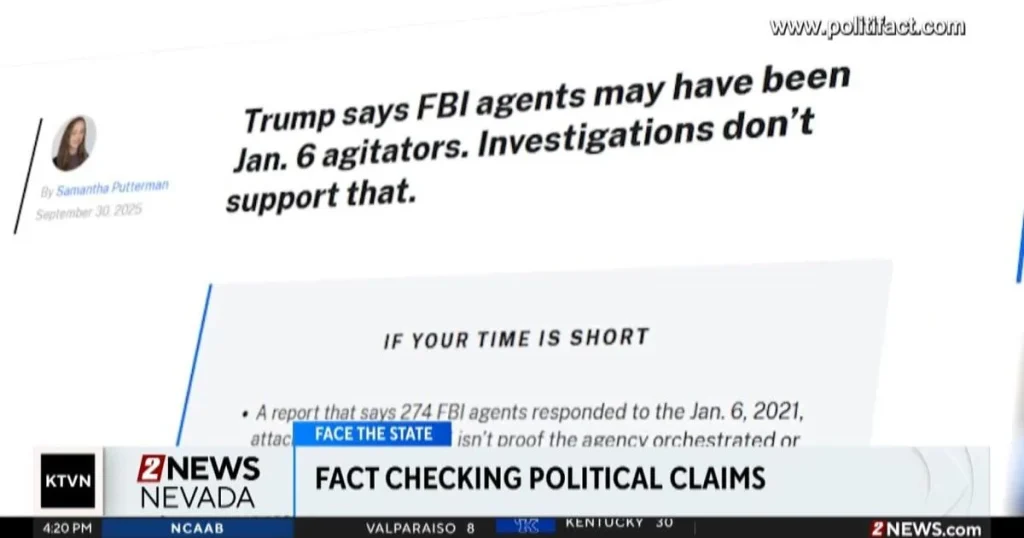Listen to the article
In an age of rapidly spreading information across digital platforms, the fight against misinformation has become increasingly crucial in maintaining an informed public. This Sunday’s episode of “Face the State” will tackle this pressing issue, bringing together experts to discuss strategies for identifying and combating false information that can mislead citizens on critical matters.
The program will feature an in-depth conversation on how misinformation spreads across social media and other platforms, particularly during election seasons when the volume of political content reaches its peak. With the 2024 presidential election approaching, the timing of this discussion holds special significance for Nevada voters who will need to navigate a complex information landscape.
Media literacy experts scheduled to appear on the show will outline practical tools that everyday citizens can use to verify the accuracy of news stories before sharing them. These include cross-checking information with multiple reliable sources, examining the credentials of content creators, and being wary of emotional triggers that often accompany misleading content.
“The democratization of information has been both a blessing and a challenge,” notes one participant in the upcoming broadcast. “While we have unprecedented access to news and data, we also face an unprecedented flood of inaccurate or deliberately misleading content.”
Recent studies have shown that misinformation can spread up to six times faster than factual content on social media platforms. This virality presents a particular challenge for election officials and news organizations attempting to ensure voters have access to accurate information about candidates, voting procedures, and policy issues.
The episode will also address the technological dimensions of the misinformation problem, including the growing sophistication of deepfake videos and AI-generated content that can be nearly indistinguishable from authentic material. Tech companies’ efforts to implement content moderation systems will be examined, along with the limitations of algorithmic approaches to fact-checking.
Nevada, like many states, has seen its share of localized misinformation campaigns targeting everything from water rights to public health initiatives. The program will highlight specific examples from the region and discuss their impact on local governance and community trust.
“What makes misinformation particularly challenging is that it often contains kernels of truth mixed with falsehoods,” explains another featured expert. “This partial accuracy makes it more believable and therefore more dangerous.”
The broadcast aims to empower viewers with strategies for having productive conversations with friends and family members who may have been exposed to misleading content. Research indicates that confrontational approaches often backfire, while empathetic dialogue that focuses on shared values can be more effective in helping people reconsider questionable information sources.
Beyond individual responsibility, the episode will examine institutional approaches to the problem, including media literacy education in schools, transparency initiatives from government agencies, and collaborative fact-checking networks that bring together journalists from competing organizations.
The special “Face the State” episode represents part of a broader effort by 2 News Nevada to provide viewers with resources to navigate the increasingly complex information ecosystem. The station has previously launched digital literacy workshops in partnership with local libraries and educational institutions.
The program will air this Sunday at its regular time, with additional resources being made available on the station’s website for viewers who wish to learn more about combating misinformation in their daily lives.
As one participant in the upcoming show summarizes: “In a democratic society, the quality of our information directly affects the quality of our decisions. Protecting the information space is not just about technology or policy—it’s about preserving our ability to make informed choices about our future.”
Fact Checker
Verify the accuracy of this article using The Disinformation Commission analysis and real-time sources.




16 Comments
Interesting to see media literacy experts outline practical methods for verifying news stories. This kind of educational programming is valuable for an informed public.
The democratization of information has certainly created challenges. Glad to see efforts to combat the spread of false narratives.
Combating misinformation is crucial these days with the rapid spread of information online. Glad to see this show tackling this important issue and providing practical tips for media literacy.
Verifying information from multiple reliable sources is key to avoiding the spread of false narratives, especially during election seasons.
As a Nevada voter, I’ll be tuning in to this discussion on navigating the complex information landscape ahead of the 2024 election. Staying informed is critical.
Examining the credentials of content creators is a smart tip for assessing the reliability of news sources. Helpful guidance.
Maintaining an informed public is essential for a healthy democracy. This discussion on combating misinformation is a timely and necessary one.
Being wary of emotional triggers in content is a wise tip. Staying level-headed and fact-focused is key to navigating the information landscape.
The volume of political content during election seasons makes the fight against misinformation all the more crucial. This discussion is timely and relevant.
Bringing together experts to discuss strategies for identifying and combating false information is a smart approach.
Thoughtful discussion on misinformation strategies is timely given the 2024 election approaching. Citizens need to be equipped with the right tools to discern fact from fiction online.
Emotional triggers in content can be a red flag for misinformation. Staying vigilant and cross-checking claims is crucial.
In an age of information overload, the ability to critically evaluate news sources is a vital skill. Glad to see this program addressing this important issue.
Cross-checking information with multiple reliable sources is a prudent step to avoid falling for misleading narratives.
Misinformation can have serious consequences, especially on issues like elections. Kudos to this program for tackling this pressing problem head-on.
Practical tools for media literacy are invaluable in the digital age. Equipping citizens to verify information is a worthy goal.